Happy Birthday, Edgar!
We’re celebrating the first birthday of the Zoo’s youngest Allen’s swamp monkey today only because of the care and dedication of the staff who hand-raised him.
One year ago today, the Zoo’s welcomed its newest Allen’s swamp monkey, Edgar. Primate curator Becky Malinsky was relieved he’d arrived alive and healthy. But there was something odd about him: The wrong mother monkey was holding him.
Staff had arrived early in the morning to discover Edgar’s mother, Zawadi, had given birth overnight. But they found Layla, his grandmother, cradling the little newborn, who weighed just 400 grams, or as much as a bar of soap. While Layla’s body heat kept tiny Edgar warm enough, she could not produce the milk he needed for nourishment.
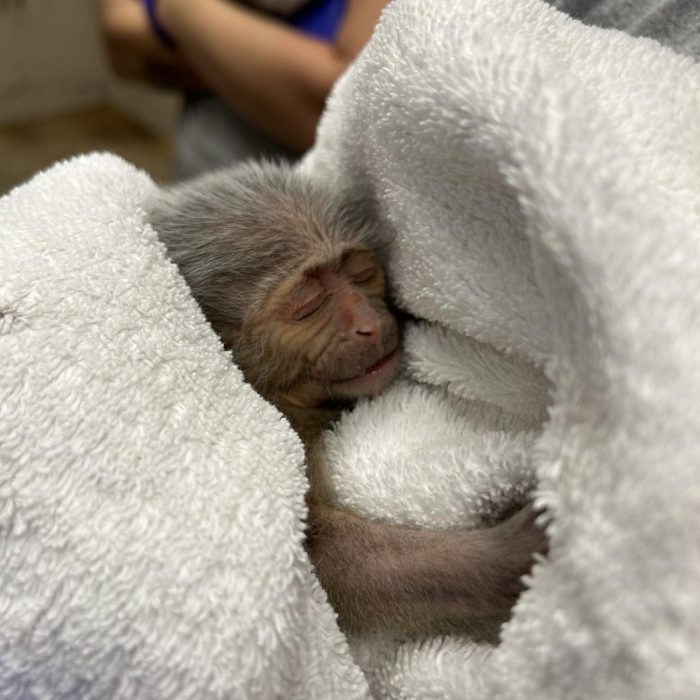
Edgar swaddled in blanket a few hours after his birth. (Photo by Becky Malinsky)
Baby Edgar, like many other newborn mammals, was totally dependent on his mother for survival. And because an infant invests most of its energy in growth, their mothers are solely responsible for food, warmth and protection. In social species like the Allen’s swamp monkey, which are native to central Africa and which live in social groups, youngsters also look to their moms for cues on how to cooperate with the rest of the troop.
Edgar’s situation was concerning, and keepers knew it would be a challenge to replace the care Edgar would normally receive from his mother.
They made many attempts to encourage Zawadi to rear her infant—first a simple reintroduction, then separation, followed by sedation, and later an injection of maternal hormones. After about 16 hours, it was clear that Zawadi had no interest in raising her baby. The other members of the troop—Layla and Bakari, Edgar’s father—could not provide the right care, either.
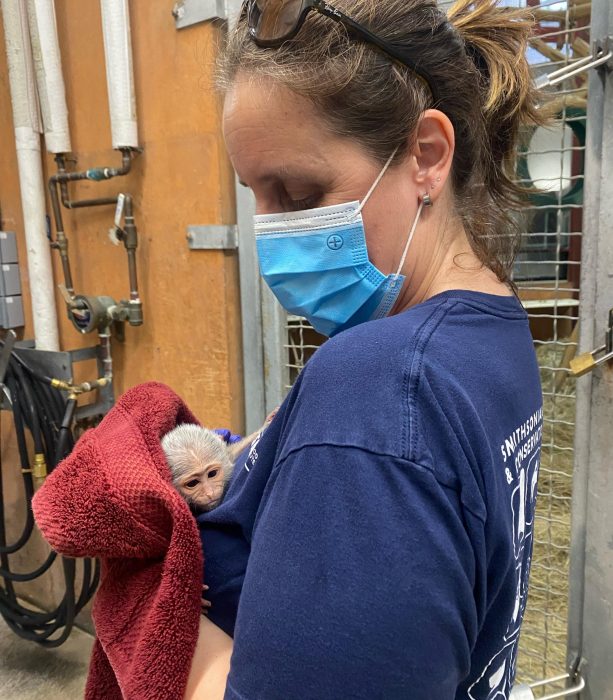
Curator Becky Malinsky holds Edgar in the backstage area of the Think Tank exhibit a few hours after his birth.
With the newborn in such a fragile state, keepers knew they had to step in to save Edgar.
Choosing hand-rearing
At zoos and other wildlife facilities, hand-rearing is necessary in cases where a mother cannot provide for her young. Animal care staff use species-appropriate knowledge when they take on the responsibility of providing an infant with care. The time commitment, especially for a primate, requires staff to go far beyond what is normally expected for the care and management of an animal.
In human care and in the wild, it’s not uncommon for animal mothers to reject their young. The reasons aren’t always entirely clear, but Zoo team members have to be prepared.
Hand-rearing is never the ideal scenario for a zoo-born animal; the goal is always to support mothers in raising their young. Birth plans created by animal care staff describe the levels of care required for a healthy outcome. For mammals, these plans include contingencies for situations where mothers either cannot or are not willing to provide care.
After assessing the situation and consulting with veterinary and nutrition staffers, Malinsky determined that the young swamp monkey would need 24/7 support by Zoo staff to ensure his survival after rejection by his mother.
Round-the-clock care
A team of 30 Zoo professionals, including animal keepers, curators, nutritionists, veterinary technicians and hospital staff, united behind the effort to care for Edgar. Malinsky also made the difficult decision to close the Zoo’s Think Tank exhibit to the public while the baby remained in a critical state.
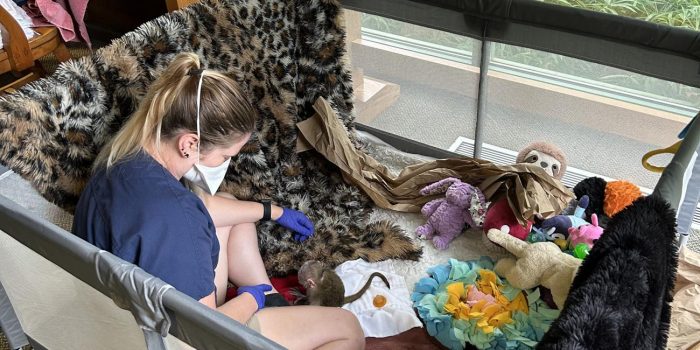
A Zoo care staffer watches over Edgar at ten days old. (Photo by Becky Malinsky)
Working in shifts, the Primate team—assistant curator Emily Bricker and keepers Erin Stromberg, Elliott Rosenthal, Carly Hornberger, Carolina Powell, Lynne McMahan, Francesca Bozzo, Hannah Wilson and Val Schultz—swaddled the young monkey in a blanket for warmth and bottle-fed him every two hours, monitoring Edgar’s health carefully as he drank up to 25% of his body weight in formula in a day. The Zoo’s nutrition team provided a milk-replacement formula designed for primates. Animal care staff weighed Edgar every morning to make sure he was hitting his weight and developmental milestones.
One of the biggest challenges was providing both physical contact and mental simulation for the young monkey while he was awake.
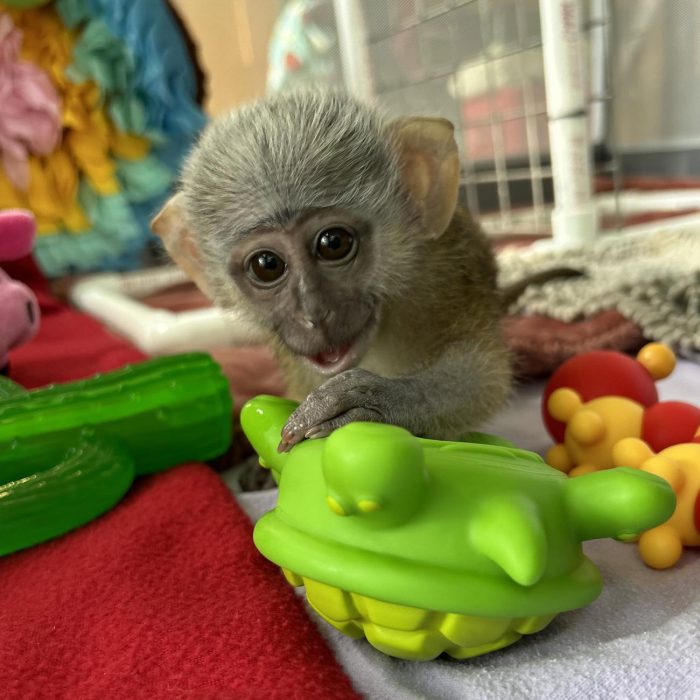
Edgar in his nursery at three weeks old. (Photo by Becky Malinsky)
“Primates need so much attention compared to other animals,” said veterinary technician Jayne Hutcheson. “As social creatures, they’re intensive and they have a real need for connection. Edgar needed a face to look at. He would call when his caretaker went out of sight and wait until they called back before calming down.”
Learning how to be a monkey
By October 2023, Edgar had gained strength and required less constant care. Now that Edgar’s survival seemed more certain, Malinsky pivoted to the next challenge: teaching him how to live like a monkey.
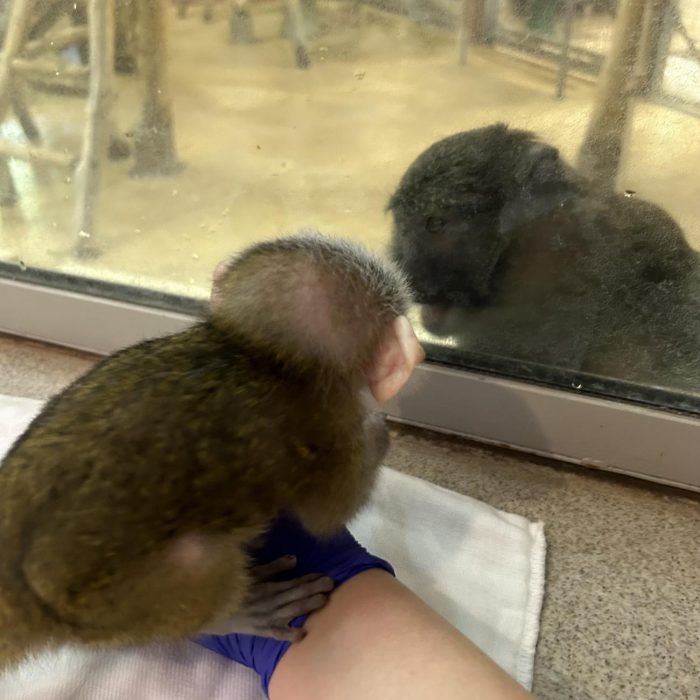
Bakari watches Edgar, at one month old, from behind protective glass. (Photo by Becky Malinsky)
The animal care team works to have each animal at the Zoo live as it would in the wild, using as many natural, species-appropriate behaviors as possible. And for social animals like monkeys, learning social behaviors is a necessary part of living peacefully within a group.
In order to give Edgar the opportunity to learn from the adults, keepers moved his nursery next to the troop’s exhibit space inside the Think Tank. After graduating from his infant playpen, staff members set up a larger temporary enclosure filled with climbing structures and toys.
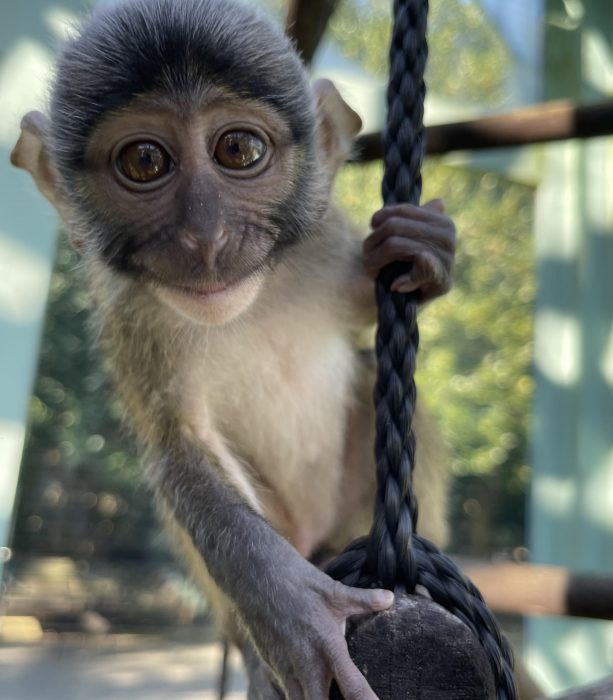
Edgar practices his climbing skills at one month old. (Photo by Becky Malinsky)
In addition to providing enrichment, the structures gave Edgar the opportunity to learn jumping and hanging behaviors by watching the rest of the troop climb and interact with their surroundings.
Primates rely on allogrooming, or social grooming, to strengthen bonds within the troop. Edgar’s caretakers helped him build this skill by grooming his fur with a toothbrush to simulate the small hands of a swamp monkey. They also encouraged Edgar to practice grooming in return.
By November, and in line with the hand-rearing plan developed by the Zoo’s nutritionists, the team began weaning three-month-old Edgar from his formula diet and encouraging him to eat solid foods.
“The weaning process can be one of the more anxiety-driven periods [of hand-rearing]. You’re changing the animals’ diet completely,” said Zoo nutritionist Erin Kendrick. “We had to get him on solids, but the right solids. So when Edgar didn’t want to eat the more nutritious items, like squash or biscuits, we had to figure out how to work around that.”
Fortunately, after weeks of persistent effort—and after discovering Edgar would eat just about anything if it was mixed with chopped-up banana—keepers fully transitioned the young monkey to an adult diet.
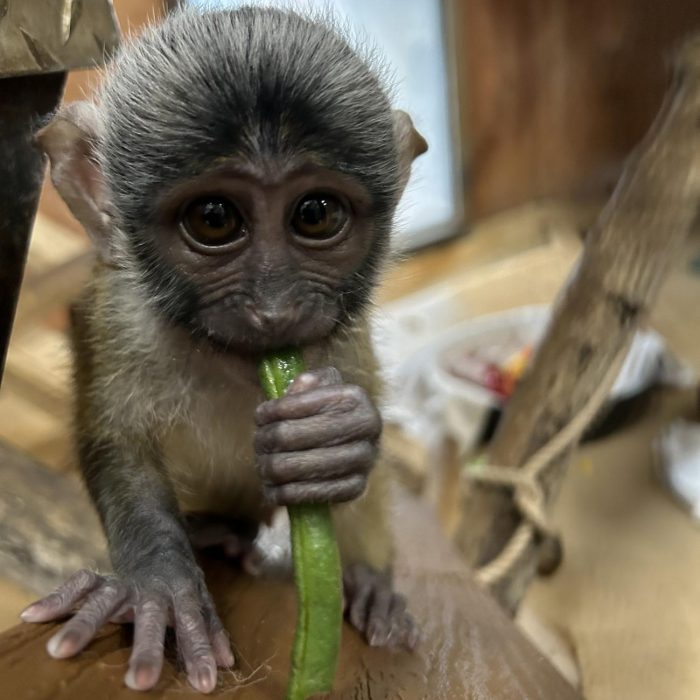
Edgar munching on a green bean at two months old. (Photo by Becky Malinsky)
Reuniting with the troop
Throughout the hand-rearing process, the Primate team kept the goal of reintroduction in mind. After several brief, unsuccessful tries to reunite Edgar with Layla early in the hand-rearing process, the team started making daily reintroduction attempts as soon as Edgar developed the right mobility skills.
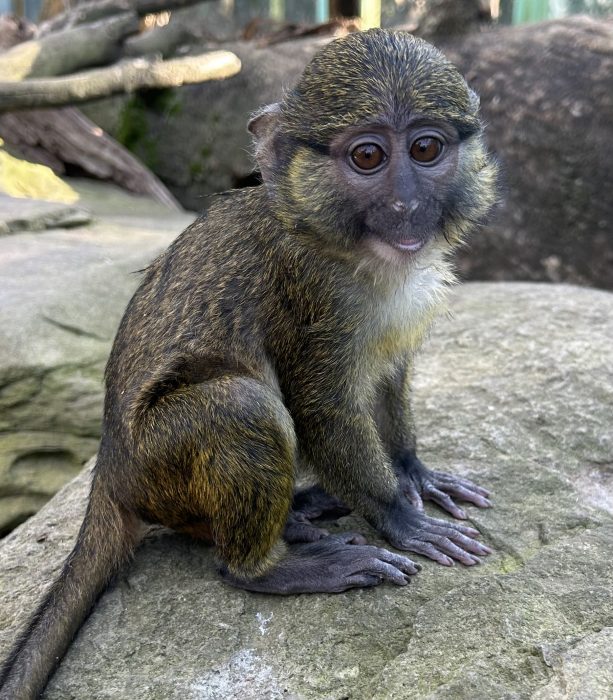
Edgar exploring his outdoor habitat area at three months old. (Photo by Becky Malinsky)
Neither party seemed thrilled at first, said Malinsky. But if Edgar was going to live a healthy life, he would need to get comfortable around the adults, and the other monkeys would need to become accustomed to having an energetic juvenile within their ranks. After many attempts, Edgar and Layla became comfortable with each other for short periods of time. Then Zawadi was brought into the mix, with similar results.
By December, staff had held overnight introductions with Edgar, Zawadi and Layla, monitoring throughout the evening to make sure there were no issues. And when dad Bakari was given a chance to interact with Edgar, Malinsky was amazed at how well the troop leader interacted with his son. “Bakari was amazing. He made himself so vulnerable and was so sweet to him.”
Finally weaned and fully introduced, and having spent several evenings with the females, Malinsky felt it was time for the group to unite by mid-December. After leaving Edgar and the troop together for three nights in a row without supervision, Malinsky arrived the morning of Dec. 21 and saw all four monkeys getting along.
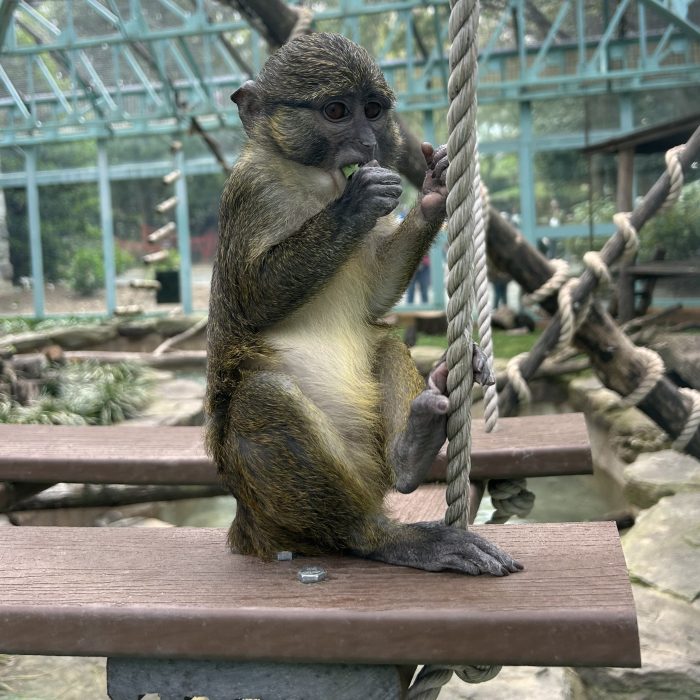
Edgar, now a juvenile at nine months old. (Photo by Becky Malinsky)
Edgar was again part of the troop.
An energetic and independent monkey
Today, Edgar is in perfect health, and energetic, fearless and independent. He entertains himself and takes cues from the adults. He gets along with Bakari and Zawadi, but he is bonded most closely with Layla. Visitors are often surprised to learn he was not raised with other monkeys.
Even though hand-rearing is never the ideal situation, the hard work that went into raising Edgar paid off, said Malinksy. “I don’t question all the hard work or the many late hours. It’s a true success story,” she said.
Posted: 21 August 2024






